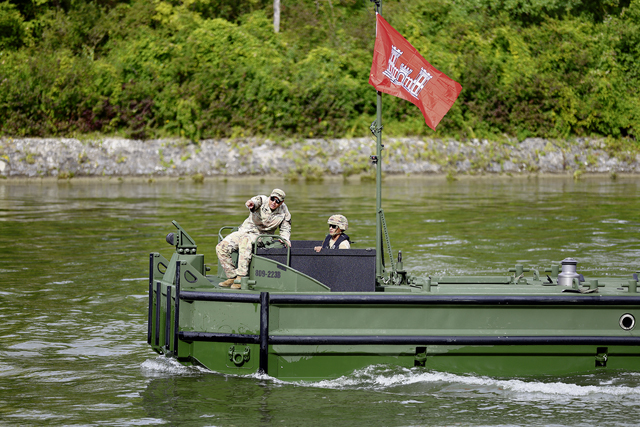
The sky was dark and grey. The fast-moving Danube River in Ingolstadt, Germany, was swollen against its banks from several days of heavy rain.
Sgt. Daniel Beltran, a bridge crewmember crew chief assigned to the 809th Multi-Role Bridge Company, stepped to the water’s edge with a few fellow Soldiers to begin measuring the speed of the water’s current passing by before the company began the first day of field testing its new bridging equipment.
As if he were caught in a nightmare, a Soldier spotted a body floating face down in the Danube as the current carried it by. He quickly summoned Beltran.
“I stood there for a moment and watched to see what was happening. I thought it was possible someone was going for a swim. I saw some erratic movement and then realized that she was facedown and not moving. I started watching to see if there were any bubbles or anything. I told the CO (commanding officer) and got permission to jump in,” said Beltran.
Beltran plunged into the 55-degree water and fought the swift current while dragging the lifeless body 20-30 feet back to the shoreline.
“I got her back to the shore, and some Soldiers helped me drag her out, and we realized that she was unresponsive and not breathing. I held her head while Sergeant [Chad] Kuderer helped with chest compressions,” said Beltran.
The limp body began to show signs of life. After what felt like an eternity, Beltran found a weak radial pulse. The woman began regurgitating water. Beltran then instructed Sergeant Kenneth Mcgray to continue chest compressions because she still was not breathing on her own. Fortunately, an ambulance arrived quickly and began care for the woman, who began breathing and regained enough consciousness to speak German to the medical personnel.
“I believe from the moment I jumped into the water until we handed her off to the medics was five to eight minutes,” said Beltran.
Although the beginning of the 809th MRBC’s training had gotten to a unique and dramatic start, this wasn’t Beltran’s first rodeo. As a former Marine stationed in Okinawa, Beltran was out on a scuba-diving trip when a fellow diver’s tank ran out of air. Beltran conducted emergency underwater recovery procedures to share the remaining air in his own tank and guide the diver to the surface safely.
“I am scuba and CPR certified and have had lifeguard training. I wanted to reach her as fast as possible and pull them out to safety so it didn’t cause further injury to them or myself. I am glad I was able to help,” Beltran said.
According to Capt. Michael MacGovern, the 809th company commander, a lot of luck combined with bravery and training was the winning recipe for the day.
“We were lucky. That was moving pretty quickly. If we had been a few minutes later, she would have been gone. Sergeant Beltran is a good NCO with a strong character. He’s dedicated and generally laid back but professional and an expert in his craft. He’s one of the phenomenal NCOs we have on the team. He just dived in and handled the situation,” said MacGovern.
After the event, Beltran dried off and continued the two-week-long bridging equipment field testing, culminating with the company’s first bilateral exercise where the Soldiers ferried a German Pioneer Panzer tracked vehicle across the river and back successfully.


